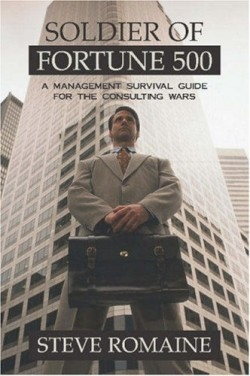Soldier of Fortune 500
A Management Survival Guide for the Consulting Wars
Consultants seem to have taken over the business world. They are hired by businesses to tell them what to do and how to do it, and then get paid by businesses to do it for them.
This book is a morality tale, told in modern terms, where the hero loses because he wants to do what’s right. Our hero, though, is fighting an entrenched adversary in a culture where politics rule, the players of the game cheat, and the kid who tells the emperor that he has no clothes on is punished for his honesty.
The author has been in business as a salesman, manager, and consultant for more than twenty years. His story, told primarily from inside NationsBank (now Bank of America), details his fight to keep Andersen Consulting (currently of Enron fame) ethical in their dealing with NationsBank. Romaine’s problem is that Andersen has more clout in the bank structure than the employees do.
Soldier is different from most management books. It doesn’t tell the reader what to do. Romaine tells his story, offering at the end of each chapter tips on what to look for in consultants and how to manage them so as to keep them from managing you. Most of his recommendations are simply common sense.
Occasionally, the author provides examples of other consultant operations where the client company loses control. IBM, for instance, lost control of the computer industry by licensing programming to Microsoft and computer chip manufacturing to Intel, neither of which needs IBM anymore.
Romaine comes across as cynical about the consultancy industry. He is by turns hopeful, helpful, and ingenious in his analysis of business, but then can turn negative, expressing an obvious distaste for consultants in general, Andersen in particular, and bureaucracy in any case. He does admit this bias: “No consultants are completely objective; certainly not this author.”
There are some good lessons to learn from Soldier of Fortune 500, especially for readers in a position to deal with consultants. Romaine’s intent, as he puts it, is to “provide guidance in recognizing potential abuses and avoiding them in the future.” In this aim, he succeeds. Even for those not in business, it’s an interesting story, and worth the read.
Reviewed by
Andrew Willis
Disclosure: This article is not an endorsement, but a review. The publisher of this book provided free copies of the book to have their book reviewed by a professional reviewer. No fee was paid by the publisher for this review. Foreword Reviews only recommends books that we love. Foreword Magazine, Inc. is disclosing this in accordance with the Federal Trade Commission’s 16 CFR, Part 255.

